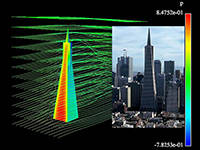New Specialization in Simulation-driven Engineering (SdX)
Name of the program:
SdX program, where X represents industry-specific specializations with an appeal to students preparing for mechanical, design, manufacturing, biomedical, structural, geotechnical and aerospace engineering careers.
Mission:Teach MS students and professionals the fundamentals and applications of simulations-driven engineering with industry-specific specializations in mechanical, design, manufacturing, structural, geotechnical and aerospace engineering. Program Contacts:Dr. Manohar Kulkarni, PE (Mechanical) at manohar.kulkarni@northwestern.edu Dr. Karen Chou, PE (Civil) at karen-chou@northwestern.edu SdX Director and Professor Wing Kam Liu, PhD, PE at w-liu@northwestern.edu |
 |
|
Core Faculty: Jian Cao, Wei Chen, Charles Dowding, Richard Finno, Mark Fleming, Sridhar Krishnaswamy, Neelesh Patankar, Greg Wagner |
|
When:
Starting in academic year 2014-2015
Purpose of the program:This program is for students finishing a BS in engineering or those with professional experience having a desire to move into the cutting-edge field of simulation driven engineering. Dedicated, intensive and hands-on courses & projects provide thorough training and preparation for exciting jobs or career advancement. The SdX program will leverage NU’s highly-ranked mechanics program to address emerging needs in the aerospace, mechanical and civil structures area. Each of these areas is enjoying a resurgence of interest. In aerospace, unmanned aerial vehicles are increasingly becoming important for both military and civilian applications. In the space sector, the US has embarked on an ambitious effort to privatize space launches. In civil structures, there is renewed interest in ultra high-rise buildings, especially abroad. In the automotive area, the Big 3 now have competition from companies such as Tesla Motors. All these factors point to increased demand for engineers with expertise in SdX. The program provides BS/MS & MS students; and working professionals an opportunity to get industry specific training in these areas. |
 |
|
Simulation methods, such as the finite element method, meshfree, discrete and particle methods, and thermal/fluid dynamics, are powerful tools that are used extensively throughout all engineering disciplines to design products and reduce time to market by performing “virtual testing” on the computer before physical prototypes are built. Students in this program will acquire highly-marketable skills that are of great demand in several industry sectors. |
|
New learning opportunities!
- Computational Forensics and Failure Analysis (spring quarter)
- Thermomechanical FEM and Design Optimization (winter quarter)
- Biomechanics and integrated computational material engineering (to be added in the near future)
Program description:
The SdX program will be structured as either a 3-quarter program or a 4-quarter program (including summer), with a required set of core courses and electives from the four blocks as follows:
Fundamentals block (4 units)
Students will learn the fundamentals of the finite element method and computational fluid dynamics. Representative courses include:
- ME-CEE 327 Finite Elements in Mechanics
- ME-CEE 426-I Advanced Finite Element Methods I
- ME-CEE 426-II Advanced Finite Element Methods II**
- TBD: Computational Thermal-Fluid Dynamics**
Applications block (3 units)
Students will learn how computational methods are used to solve engineering problems in aerospace, mechanical and civil engineering. In order to provide the students in the SdX program a range of applications-focused courses, we intend to create over the next several years a library of digital courses, such as simulations-based forensic fracture, aerostructures, aerodynamics, nuclear engineering, etc. The digital course material can be drawn upon as necessary depending on student interest, and may be offered to the students in small groups rather than to the entire SdX cohort. Selective representative courses include:
- ME/CEE 395 Computational Forensics and Failure Analysis (New)
- ME/CEE 366 Thermomechanical FEM and Design Optimization (Modified)
- Simulation-driven Aerostructures, TBD
- Simulation-driven Aerodynamics, TBD
- Simulation-driven Nuclear Engineering, TBD
Electives block (4 units)
Students will select complementary courses from the general McCormick/ME/CEE programs to increase their breadth and depth of knowledge in SdX-relevant topics. Representative courses include:
- ME341 Computational Methods for Engineering Design
- ME 362 Stress Analysis
- ME363 Vibrations
- CEE317 Continuum Mechanics
- CEE 414 Composite Materials
- ME441 Engineering Optimization for Product Design and Manufacturing
- ME417 Multiscale Modeling and Simulations in Solids
Optional Project block (2 units)
Students will use simulations-driven engineering tools in an independent study project. For working professionals, this could involve job-specific projects. This will involve independent study by the students with a final report at the end. Technical report writing will be taught as part of the program.
A Sample 4-quarter (including summer) MS in Simulation-driven Mechanical and Aerospace Engineering
|
Fall |
Winter |
Spring |
Summer |
|
ME-CEE 327 Finite Element Methods (FEM) |
ME-CEE 426-1 Advanced FEM I |
ME-CEE 426-2 Advanced FEM II |
Optional Internships / Project block (2 units) |
|
CEE 317 Continuum Mechanics |
ME/CEE 366 Thermomechanical FEM and Design Optimization |
ME 362 Stress Analysis / Aerostructures /
|
|
|
ME 417 Multiscale Modeling |
ME/CEE Elective |
ME/CEE 395 Computational Forensics and Failure Analysis (New) |
|
|
ME-423 Computational Fluid Dynamics |
CEE 414 Composites/Elective |
ME 363 Vibrations |
|
